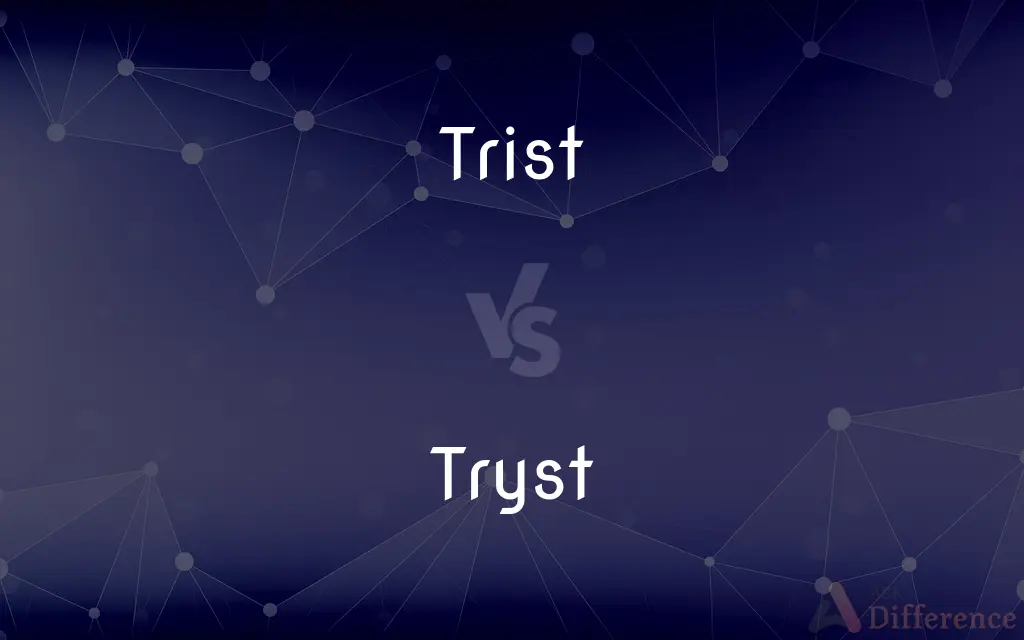Trist vs. Tryst — What's the Difference?
By Fiza Rafique & Urooj Arif — Updated on February 26, 2024
Trist refers to a state of sadness or melancholy, while Tryst is a prearranged meeting between lovers, showcasing the emotional vs. relational aspect of the terms.

Difference Between Trist and Tryst
Table of Contents
ADVERTISEMENT
Key Differences
Trist embodies a feeling of sadness or melancholy, often used in literary contexts to describe a deep, pensive sadness. Tryst, in contrast, is rooted in the concept of a secret rendezvous, specifically between lovers. It carries a sense of anticipation and privacy, highlighting a planned encounter that is often romantic or intimate in nature.
Trist captures an emotional state, conveying a sense of solitude or introspection associated with sorrow or disappointment. Tryst emphasizes the connection between individuals rather than an internal emotional experience.
Trist paints a picture of solitude and perhaps longing, tryst suggests companionship and secrecy. The former is introspective, dealing with one's own feelings internally, whereas the latter tryst is interactive, involving an external relationship dynamic.
The origin of "trist" can be traced back to the Latin word "tristis," meaning sad or sorrowful, which reflects its usage in describing an emotional state. "Tryst," however, stems from the Old French word "triste," meaning a waiting place for hunters, which has evolved into its current meaning related to meetings, especially of a romantic or secretive nature.
A trist might be used to set the mood or tone of a scene, encapsulating a character's despair or sorrow. On the other hand, a tryst can drive the plot forward, creating moments of tension, secrecy, or the deepening of a relationship between characters.
ADVERTISEMENT
Comparison Chart
Definition
A state of sadness or melancholy.
A prearranged meeting between lovers.
Context
Emotional, introspective.
Relational, often secretive or romantic.
Origin
Latin "tristis," meaning sad or sorrowful.
Old French "triste," a waiting place for hunters.
Literary Use
To describe feelings or set a mood.
To advance plot or describe a relationship dynamic.
Emotional vs. Relational
Emphasizes an individual's internal state.
Focuses on the interaction between people.
Compare with Definitions
Trist
Describing a somber mood.
The music captured the trist of the movie's theme.
Tryst
An appointment to meet.
Their tryst was set for midnight.
Trist
A state of melancholy.
The gloomy weather added to his trist.
Tryst
A secret meeting between lovers.
They arranged a tryst at the old farmhouse.
Trist
A feeling of sadness.
The news of her departure filled him with trist.
Tryst
A meeting agreed upon.
The tryst was kept despite the dangers involved.
Trist
Reflecting sorrow.
Her eyes were full of trist at the farewell.
Tryst
A romantic encounter.
The novel revolves around the lovers' tryst.
Trist
Emotional sorrow.
The poem conveyed a deep sense of trist.
Tryst
A rendezvous.
The garden was their chosen spot for the tryst.
Trist
Sad; sorrowful; gloomy.
Tryst
A usually private meeting or meeting place that has been agreed on by lovers.
Tryst
An agreement between lovers to meet at a certain time and place.
Tryst
Trust.
Tryst
An appointment to meet; also, an appointed place or time of meeting; as, to keep tryst; to break tryst.
The tenderest-hearted maidThat ever bided tryst at village stile.
Tryst
To agree with to meet at a certain place; to make an appointment with.
Tryst
To mutually agree to meet at a certain place.
Tryst
A secret rendezvous (especially between lovers)
Common Curiosities
How are Trist and Tryst pronounced?
Trist is pronounced with a short "i" sound, similar to "list," while Tryst is pronounced with a long "i" sound, like "sighed."
What does Tryst mean?
Tryst means a prearranged meeting, often secret, between lovers.
What is the meaning of Trist?
Trist refers to a state of sadness or melancholy.
Where does the term Trist originate from?
It originates from the Latin "tristis," meaning sad or sorrowful.
Can a Tryst be non-romantic?
Originally, it could refer to any prearranged meeting, but it's now primarily associated with romantic or secretive meetings.
Can Trist and Tryst be used interchangeably?
No, due to their distinct meanings related to emotional states vs. relational meetings.
Do Trist and Tryst have the same emotional weight?
While both can be emotionally charged, Trist conveys an internal state of sadness, and Tryst focuses on the anticipation and secrecy of a meeting.
Is there a positive connotation to Tryst?
Yes, it often carries a romantic or exciting connotation related to love and secret meetings.
How do the origins of Trist and Tryst influence their usage?
Trist’s Latin root for sadness influences its use for emotional states, while Tryst’s origin related to meetings shapes its use for describing encounters.
What is the origin of Tryst?
Tryst comes from the Old French "triste," referring to a waiting place for hunters, evolving to its current romantic meeting connotation.
How is Trist used in literature?
It's often used to describe a character's deep sadness or to set a melancholic mood.
What is the significance of a Tryst in stories?
A tryst can signify a crucial, often secretive, romantic or dramatic moment between characters.
Is Trist commonly used in everyday language?
Trist is less common in casual conversation, more often found in literary or formal contexts.
Can Trist have a physical representation?
Trist typically describes an emotional state rather than a physical object or place.
Share Your Discovery

Previous Comparison
Softcover vs. Paperback
Next Comparison
Tagliatelle vs. LinguineAuthor Spotlight
Written by
Fiza RafiqueFiza Rafique is a skilled content writer at AskDifference.com, where she meticulously refines and enhances written pieces. Drawing from her vast editorial expertise, Fiza ensures clarity, accuracy, and precision in every article. Passionate about language, she continually seeks to elevate the quality of content for readers worldwide.
Co-written by
Urooj ArifUrooj is a skilled content writer at Ask Difference, known for her exceptional ability to simplify complex topics into engaging and informative content. With a passion for research and a flair for clear, concise writing, she consistently delivers articles that resonate with our diverse audience.
















































